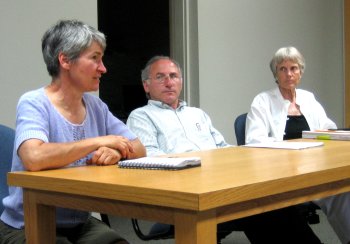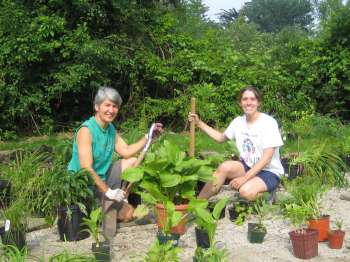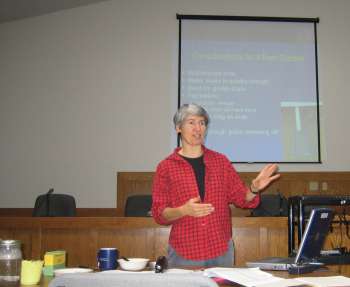- By Dan Veaner
- Around Town
 Print
Print
Cayuga Watershed Networks' Sharon Anderson told Village of Lansing Trustees that there is grant funding and volunteer labor to pay for and build a rain garden in front of the Village office on Triphammer Road. She explained what a rain garden is, and outlined a proposal that would not only create one, but also include an educational component for Village residents. "One little rain garden in the Village isn't going to do a whole lot," said Trustee Lynn Leopold. "But if people see this one and catch onto the idea and they all start putting them in on their properties, it can multiply the slowing effect."

Sharon Anderson (left) offers the Village of Lansing a rain garden
as Trustees Larry Fresinski (center) and Lynn Leopold look on.
Anderson has installed several rain gardens including one at her own house, and another behind the community center in the Town of Lansing. She also teaches sessions on building rain gardens and their benefit, and offered to conduct a session for Village residents. "The water sits in a rain garden for just a couple of days, so it's not long enough to breed mosquitoes," she explained. "The water comes in -- if we have heavy rain storms some of it drains off in its natural pattern. The idea is to capture rain if we get about an inch of water."
Anderson said that she already has help lined up to build a rain garden in the Village. "The Cornell Master Garden program is doing state-wide training," she said. "They would like me to do an installation for them. The Village would be an ideal site. So that means there are volunteers to do most of the work."
Rain gardens mimic natural absorption and filtering found in forests and meadows, and can potentially be 30% to 40% more absorbent than an average lawn. They resemble a shallow bowl protected with a surrounding berm that has an opening so that excessive rain water beyond the capacity of the garden can drain off in its natural pattern. Anderson explained that rain garden plants have to be able to withstand being saturated with water for a few days, and also being dry.
She also noted that the project would help with three of the six new storm water requirements being imposed on municipalities by New York State. "When it is time to do the annual report it gives you credit for public education, public participation, and good housekeeping," she said.

Sharon Anderson (left) and Town Environmental Planner Darby Kily
installed a rain garden behind the Lansing Community Center last June
Because the soil is poor for gardening, Trustees agreed that the Village Department of Public Works would dig the garden space. Anderson said she would be at the next Trustee meeting with a design for Trustees to approve, and that the garden would actually be created in mid-July. She suggested an educational session for Village residents a few days before installing the garden so they can learn about rain gardens and then help plant one. She asked that the Trustees approve a plan before mid-July when Cornell Master Garden students will get classroom instruction and then be bussed to the Village office to help create the rain garden. "The Village is an ideal site," she told the board.
Anderson explained that the grant money comes from the New York State Water Quality Improvement Program. Once the garden is planted she said she would monitor it to see which plants don't survive the first season, and replace plants that don't make it though the winter. Some of the plants in the Town garden include dogwoods, magnolia, elderberry, cone flower, day lilies, hosta, Syberian iris, swamp milk weeds. She said she would choose plants that are less desirable for deer, though she noted that temporary fencing might be needed because deer eat anything when they are hungry enough.

Anderson offers sessions to teach residents about the benefits
of rain gardens and explain how they can build their own
Mayor Don Hartill asked Anderson to return to the next board meeting with a design and a list of what the DPW would have to do to prepare the spot. Anderson said she would confer with Leopold beforehand about design ideas, and dig some holes on the site to determine how bad the soil is. Trustees were enthusiastic about the project. "I think this is ideal, and they're pretty," noted Leopold.
----
v3i21

Sharon Anderson (left) offers the Village of Lansing a rain garden
as Trustees Larry Fresinski (center) and Lynn Leopold look on.
Anderson has installed several rain gardens including one at her own house, and another behind the community center in the Town of Lansing. She also teaches sessions on building rain gardens and their benefit, and offered to conduct a session for Village residents. "The water sits in a rain garden for just a couple of days, so it's not long enough to breed mosquitoes," she explained. "The water comes in -- if we have heavy rain storms some of it drains off in its natural pattern. The idea is to capture rain if we get about an inch of water."
Anderson said that she already has help lined up to build a rain garden in the Village. "The Cornell Master Garden program is doing state-wide training," she said. "They would like me to do an installation for them. The Village would be an ideal site. So that means there are volunteers to do most of the work."
Rain gardens mimic natural absorption and filtering found in forests and meadows, and can potentially be 30% to 40% more absorbent than an average lawn. They resemble a shallow bowl protected with a surrounding berm that has an opening so that excessive rain water beyond the capacity of the garden can drain off in its natural pattern. Anderson explained that rain garden plants have to be able to withstand being saturated with water for a few days, and also being dry.
She also noted that the project would help with three of the six new storm water requirements being imposed on municipalities by New York State. "When it is time to do the annual report it gives you credit for public education, public participation, and good housekeeping," she said.

Sharon Anderson (left) and Town Environmental Planner Darby Kily
installed a rain garden behind the Lansing Community Center last June
Because the soil is poor for gardening, Trustees agreed that the Village Department of Public Works would dig the garden space. Anderson said she would be at the next Trustee meeting with a design for Trustees to approve, and that the garden would actually be created in mid-July. She suggested an educational session for Village residents a few days before installing the garden so they can learn about rain gardens and then help plant one. She asked that the Trustees approve a plan before mid-July when Cornell Master Garden students will get classroom instruction and then be bussed to the Village office to help create the rain garden. "The Village is an ideal site," she told the board.
Anderson explained that the grant money comes from the New York State Water Quality Improvement Program. Once the garden is planted she said she would monitor it to see which plants don't survive the first season, and replace plants that don't make it though the winter. Some of the plants in the Town garden include dogwoods, magnolia, elderberry, cone flower, day lilies, hosta, Syberian iris, swamp milk weeds. She said she would choose plants that are less desirable for deer, though she noted that temporary fencing might be needed because deer eat anything when they are hungry enough.

Anderson offers sessions to teach residents about the benefits
of rain gardens and explain how they can build their own
Mayor Don Hartill asked Anderson to return to the next board meeting with a design and a list of what the DPW would have to do to prepare the spot. Anderson said she would confer with Leopold beforehand about design ideas, and dig some holes on the site to determine how bad the soil is. Trustees were enthusiastic about the project. "I think this is ideal, and they're pretty," noted Leopold.
----
v3i21



